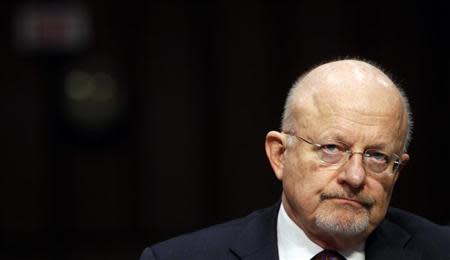U.S. plans reports on secret court orders to telecom providers
By Alina Selyukh WASHINGTON (Reuters) - The U.S. intelligence community has pledged to disclose more data about government surveillance programs by reporting annually how many secret court orders are issued to telecommunications companies under certain legal rules. Director of National Intelligence James Clapper on Thursday announced a plan to release the total number of legal orders issued every 12 months to telecom companies by the secret Foreign Intelligence Surveillance Court, and the number of targets affected by those orders. The court orders, under authority granted by the Foreign Intelligence Surveillance Act and National Security letters, allow collection of information about subscribers and call records, both for past communications and ongoing wiretaps. But only the aggregate annual numbers of these court orders will be made public. The move is part of President Barack Obama's response to criticism about a lack of transparency in government surveillance programs following leaks by former spy agency contractor Edward Snowden. Earlier this month, the government for the first time released opinions, previously labeled Top Secret, from the FISA Court. In the past its decisions involving electronic surveillance and communications collection by the National Security Agency had not been made public. Privacy advocates have been urging the government to start shedding light on the FISA court and its surveillance operations and offered a tempered welcome to Thursday's news. "This is a good start as it pulls back the covers a bit on the government authorities, but we still need more information," said Marc Rotenberg, president of the Electronic Privacy Information Center advocacy group. It urged further disclosures about the cost and effectiveness of the surveillance. Kurt Opsahl, senior staff attorney at the data privacy group Electronic Frontier Foundation, expressed concerns that the pledge to release the number of affected investigation targets could severely limit the amount of data to be actually released. "The number of targets affected isn't as much the issue on the public's mind as the number of innocent people affected," he said, pointing to the leaked secret FISC order to Verizon Communications Inc that did not address any targets. Obama and other U.S. officials have said the NSA surveillance programs are lawful, have been approved by Congress and the FISA Court, and are aimed at detecting and disrupting terrorist plots. "FISA and national security letters are an important part of our effort to keep the nation and its citizens safe, and disclosing more detailed information about how they are used and to whom they are directed can obviously help our enemies avoid detection," Clapper said in a statement announcing the new plan on Thursday. The FISA court has said the NSA may unintentionally have collected as many as 56,000 emails of Americans a year from 2008 to 2011 and may have violated the Constitution before adjustments were made. (Editing by Ken Wills)


